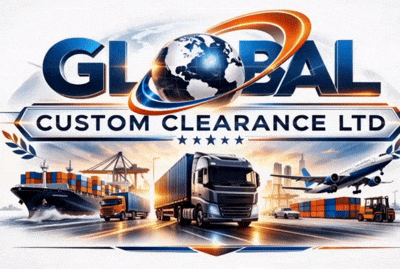Simplifying Customs Clearance in the UK: A Practical Guide for Traders

The global trading landscape is constantly evolving, and for businesses importing or exporting goods, customs clearance in the United Kingdom can often feel like a complex process. With Brexit shaping new regulations, increased documentation requirements, and varying international standards, traders need clear guidance to navigate the system. A streamlined approach to customs clearance ensures that goods flow smoothly across borders, avoiding costly delays and penalties.
This blog offers a practical guide for traders, providing an understanding of the essentials of UK customs clearance and how to streamline the process.
What is Customs Clearance?
Customs clearance is the process of getting goods approved by the relevant customs authorities before they enter or leave a country. In the UK, this means ensuring shipments comply with import and export laws, duties, and taxes. Without proper clearance, goods can be held at ports, delayed in transit, or even confiscated.
Simply put, customs clearance verifies that all legal, fiscal, and safety requirements are met before products move across borders.
Why is Customs Clearance Important in the UK?
The United Kingdom is one of the world’s largest trading hubs. Following Brexit, businesses now face stricter requirements when moving goods to and from the EU, in addition to international trade partners. Customs clearance ensures:
- Compliance with UK and international trade regulations
- Accurate payment of duties and VAT
- Protection of national security and consumer safety
- Smooth transportation and reduced risk of delays
For traders, efficient customs clearance is not just about compliance—it is about maintaining supply chain efficiency and customer satisfaction.
Key Steps in the Customs Clearance Process
Traders new to the system may find customs procedures overwhelming, but understanding the basic steps can make the process more manageable:
1. Documentation Preparation
Proper paperwork is essential. Traders need invoices, packing lists, licenses (where applicable), and a customs declaration. Errors in documentation are among the most common causes of delays.
2. Classification of Goods
Every product must be classified under a specific tariff code (HS Code). These codes determine the amount of duty and VAT payable. Misclassification can result in fines or overpayment.
3. Customs Declaration
The declaration form, submitted electronically through the UK’s Customs Handling of Import and Export Freight (CHIEF) system or its replacement, the Customs Declaration Service (CDS), provides details of the goods being moved.
4. Duty and Tax Calculation
Depending on the nature of goods and their country of origin, customs authorities calculate applicable duties, tariffs, and VAT.
5. Customs Authority Review
Once submitted, the declaration is reviewed by UK customs officials. Goods may be cleared immediately, selected for inspection, or held until further information is provided.
6. Release of Goods
After approval and payment of duties, the goods are released for delivery to the importer or exporter.
Common Challenges in UK Customs Clearance
Even experienced traders face challenges in customs clearance. Some of the most frequent include:
- Incomplete or incorrect documentation leading to shipment delays
- Incorrect HS Code classification, resulting in wrong duty payments
- Unawareness of post-Brexit changes, especially in EU trade requirements
- Unexpected costs such as storage charges for delayed shipments
- Limited knowledge of customs technology systems like CDS
Recognising these hurdles in advance can help businesses prepare better and avoid unnecessary complications.
Tips for Streamlining the Process
For traders aiming to simplify customs clearance, the following practical steps can make a significant difference:
- Stay Informed About Regulations – Keep updated on UK and international trade policies, especially as rules evolve post-Brexit.
- Work with Experienced Professionals – Customs agents or brokers can manage complex paperwork and ensure compliance.
- Use Technology Tools – Customs software can automate classification, calculate duties, and reduce human errors.
- Double-Check Documentation – Ensure accuracy in invoices, packing lists, and declarations before submission.
- Plan Ahead for Costs – Account for potential customs duties, VAT, and surcharges in your financial planning.
- Maintain Open Communication with Partners – Coordinate with suppliers, shipping agents, and brokers to ensure smooth clearance.
How Traders Benefit from Professional Support
While some businesses attempt to manage customs clearance in-house, many find the process time-consuming and prone to error. Partnering with a professional customs consultancy can save valuable time and reduce risk.
For example, Global Customs Clearance UK specialises in guiding traders through every step of customs procedures. From preparing accurate documentation to liaising with authorities, professional experts can simplify complex regulations and help businesses focus on growth instead of paperwork.
The Future of Customs Clearance in the UK
The future of customs clearance in the United Kingdom is likely to be driven by technology. Automation, artificial intelligence, and digital platforms are increasingly being used to streamline customs processes, reduce manual intervention, and speed up approvals.
At the same time, sustainability and compliance with global trade standards are becoming more important. Businesses that invest in efficient customs practices today will find themselves better prepared for tomorrow’s trading environment.
Customs clearance in the UK may appear complicated, but with the right knowledge and support, traders can navigate the process with confidence. By understanding the key steps, avoiding common mistakes, and seeking expert guidance, businesses can ensure their shipments move smoothly across borders.With reliable support from experts like Global Customs Clearance UK, traders can focus on building profitable trade relationships while leaving the complexities of customs procedures in capable hands.



